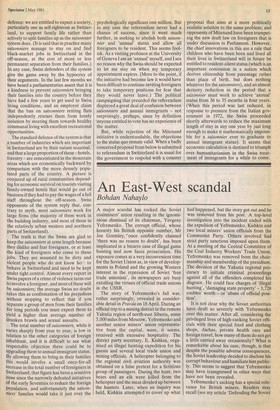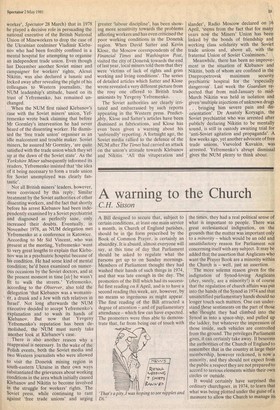An East-West scandal
Bohdan Nahaylo
A major scandal has rocked the Soviet coalminers' union resulting in the ignominious dismissal of its chairman, Yevgeny Yefremenko. The corrupt official, whose honesty his British opposite number, Mr Joe Gormley, once confidently claimed 'there was no reason to doubt', has been implicated in a bizarre case of illegal game hunting and now faces prosecution. His exposure comes at a very inconvenient time for the Soviet Union as, in view of developments in Poland and the growing Western interest in the repression of Soviet 'free trade unionists', its newspapers are busy extolling the virtues of official trade unions in the USSR.
The story of Yefremenko's fall was, rather surprisingly, revealed in considerable detail in Pravda on 18 April. During an official trip to a mining district in the remote Yakutia region of north-east Siberia, some 5,000 miles from Moscow, Yefremenko and another senior miners' union representative from the capital, were, it seems, received with excessive hospitality. The district party secretary, E. Kishkin, organised an illegal hunting expedition for his guests and several local trade union and mining officials. A helicopter belonging to the regional civil aviation authority was obtained on a false pretext for a fictitious group of passengers. During the hunt, two bears and an elk were killed from the helicopter and the meat divided up between the hunters. Later, when an inquiry was held, Kishkin attempted to cover up what had happened, but the story got out and he was removed from his post. A top-level investigation into the incident ended with the expulsion of Yefremenko, Kishkin and two local miners' union officials from the Communist Party. Others involved had strict party sanctions imposed upon them. At a meeting of the Central Committee of the Coal Industry Workers' Trade Union, Yefremenko was removed from the chairmanship and membership of the presidium. The decision of the Yakutia regional procuracy to initiate criminal proceedings against all of the offenders completed his disgrace. He could face charges of 'illegal hunting', 'damaging state property' — 3,728 roubles' worth — or 'abuse of official position'.
It is not clear why the Soviet authorities have dealt so severely with Yefremenko over this matter. After all, considering the privileged lives of high-ranking Soviet officials with their special food and clothing shops, dachas, private health care and foreign travel, how many of them do not get a little carried away occasionally? What is remarkable about his case, though, is that despite the possible adverse consequences, the Soviet leadership decided to disclose his corrupt behaviour and humiliate him publicly. This seems to suggest that Yefremenko may have transgressed in other ways that have not been revealed.
Yefremenko's sacking has a special relevance for British miners. Readers may recall (see my article 'Defending the Soviet worker', Spectator 28 March) that in 1978 he played a decisive role in persuading the national executive of the British National Union of Mineworkers to drop the case of the Ukrainian coalminer Vladimir Klebanov who had been forcibly confined in a mental hospital for attempting to organise an independent trade union. Even though last December another Soviet miner and campaigner for workers' rights, Alexei Nikitin, was also declared a lunatic and locked away after revealing the plight of his colleagues to Western journalists, the NUM leadership's attitude, based on its trust of Yefremenko, has remained unchanged.
When the NUM first raised Klebanov's case with the Soviet miners' union, Yefremenko wrote back claiming that before Mr Gormley's intervention he had never heard of the dissenting worker. He dismissed the 'free trade union' organiser as an idle malcontent and trouble maker. Soviet miners, he assured Mr Gormley, 'are quite satisfied with the trade union which they set up at the dawn of the Soviet state'. As the Yorkshire Miner subsequently informed its readers, Yefremenko insisted that 'the idea of it being necessary to form a trade union for Soviet unemployed was clearly fantastic'.
Not all British miners' leaders, however, were convinced by this reply. Similar treatment by the Soviet authorities of other dissenting workers, and the fact that shortly before his arrest Klebanov had been independently examined by a Soviet psychiatrist and diagnosed as perfectly sane, only increased their doubts. Eventually, in November 1978, an NUM delegation met Yefremenko at a conference in Katowice. According to Mr Sid Vincent, who was present at the meeting, Yefremenko 'went to very great lengths to explain that Klebanov was in a psychiatric hospital because of his condition. He had some kind of mental condition; he'd been examined on numerous occasions by the Soviet doctors, and at the present moment in time [sic] he wasn't fit to walk the streets.' Yefremenko, according to the Observer, also told the delegation 'that Klebanov was a womaniser, a drunk and a Jew with rich relatives in Israel'. Not long afterwards the NUM executive decided to accept Yefremenko's explanation and to wash its hands of Klebanov. But now that Yevgeny Yefremenko's reputation has been demolished, the NUM must surely take another look at Klebanov's case.
There is also another reason why a reappraisal is necessary. In the wake of the Polish events, both the Soviet media and two Western journalists who were allowed to visit the Donetsk mining region in south-eastern Ukraine in their own ways substantiated the grievances about working conditions in the area which initially caused Klebanov and Nikitin to become involved in the struggle for workers' rights. The Soviet press, while continuing to rant against 'free trade unions' and urging greater 'labour discipline', has been showing more sensitivity towards the problems affecting workers and has even criticised the poor working conditions in the Donetsk region. When David Satter and Kevin Klose, the Moscow correspondents of the Financial Times and Washington Post, visited the city of Donetsk towards the end of last year, local miners told them that they were `victims of lack of rights and grim working and living conditions'. The series of detailed articles which Satter and Klose wrote revealed a very different picture from the rosy one offered to British trade unionists by Yevgeny Yefremenko.
The Soviet authorities are clearly irritated and embarrassed by such reports appearing in the Western press. Predict.ably, Klose and Satter's articles have been dismissed as fabrications, and Klose has even been given a warning about his 'unfriendly' reporting. A fortnight ago, the Soviet media rallied to the defence of the NUM after The Times had carried an attack on the union's attitude towards Klebanov and Nikitin. `All this vituperation and slander', Radio Moscow declared on 16 April, 'stems from the fact that for many years now the Miners' Union has been linked by the bonds of friendship and working class solidarity with the Soviet trade unions and, above all, with the fraternal Union of Soviet Coalminers.'
Meanwhile, there has been no improvement in the situation of Klebanov and Nikitin, both of whom are confined in the Dnepropetrovsk maximum security psychiatric hospital for the 'especially dangerous'. Last week the Guardian reported that from mid-January to midMarch Nikitin was held in isolation and given 'multiple injections of unknown drugs . . . bringing him severe pain and disorientation'. Dr Anatoly Koryagin, the Soviet psychiatrist who was arrested after publicly declaring Nikitin to be mentally sound, is still in custody awaiting trial for 'anti-Soviet agitation and propaganda'. A few weeks ago, yet another advocate of free trade unions, Vsevolod Kuvakin, was arrested. Yefremenko's abrupt dismissal gives the NUM plenty to think about.



















































































 Previous page
Previous page